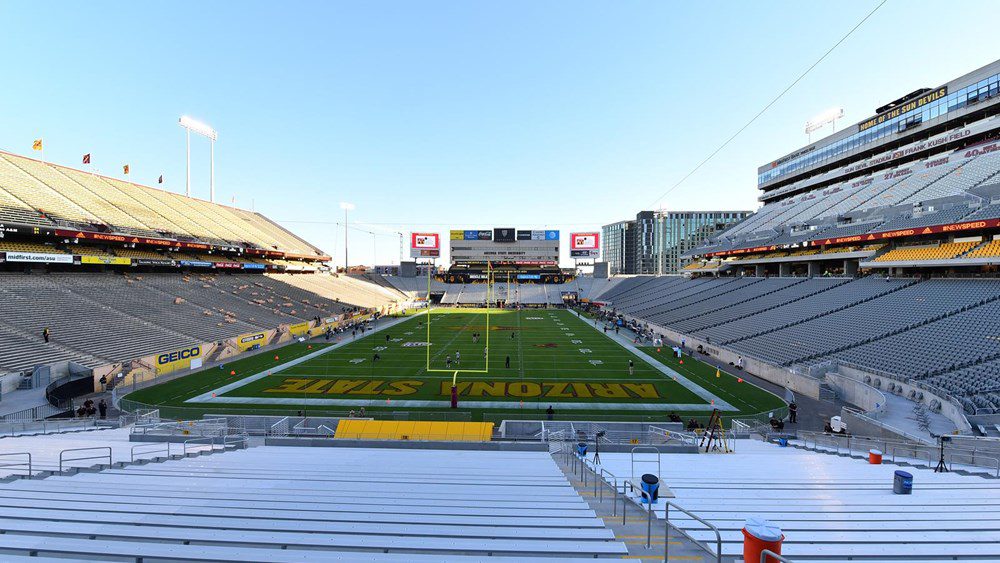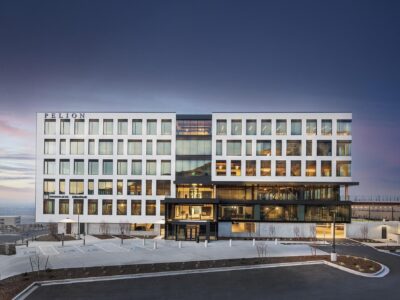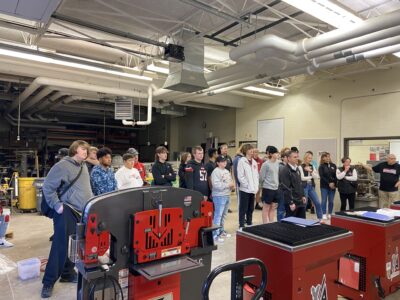Journalist David Toll, best known for writing about the Nevada desert, once said, “The Arizona desert takes hold of a man’s mind and shakes it.” I’m not sure if he was talking about the red sunsets or the red clay, or the various breeds of cactus. But Arizona has got more than cactus on its mind these days; it has gold.
Arizona State University’s Sun Devil Stadium received a gold LEED certification from the U.S. Green Building Council for its Leadership in Energy and Environmental Design, scoring a significant victory before the 2021 football season began!
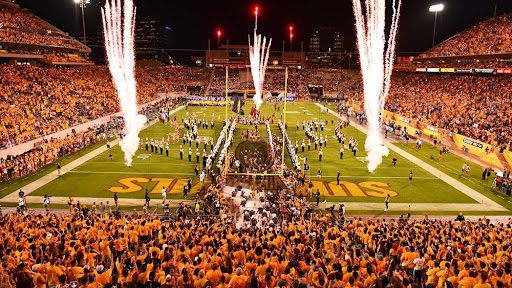
The stadium was recognized for several design elements that were part of the five-year, $300 million renovations completed in 2019. “Sustainability is part of the culture at ASU, and certainly Sun Devil Athletics has made a bold statement in the redesign of the stadium and our commitment to sustainability,” asserted Alana Levine, the Assistant Director for ASU’s Zero Waste program.
The renovated stadium incorporates original concrete superstructure columns and beams. Almost all (98%) of on-site construction waste was diverted from landfills, and approximately a quarter of the building materials had recycled content. Nearly 15% of the new Sun Devil Stadium’s materials came from within 500 miles of the Arizona State University campus, while almost 65% of the wood used was Forest Stewardship Council-certified. Contractors used low-emitting paints and sealants as well as low-volatile organic compound interior materials.
The multi-year renovation, which also included other nearby ASU athletic facilities, featured the installation of low-flow plumbing fixtures, LED lighting, and thermal comfort controls that all improved energy and water conservation.
To minimize the heat island effect, roof surfaces received a white reflective coat, and light-colored concrete was used in areas exposed to direct sunlight. To shield Sun Devil fans from the hot Arizona sun, trees were planted at specific locations outside the stadium to create more shaded areas. Sun Devil Stadium’s design complements the contours of the buttes adjacent to it while also letting in the cooling wind. The addition of native, low-water-use plants served to filter rainwater runoff and to lower the need for irrigation.
While already conveniently accessible to local buses, shuttles, and light rail, Sun Devil Stadium expanded its bicycle parking to promote alternatives to automobile usage, and fewer cars driving to the stadium decreases game day car pollution. The stadium’s parking structure does have some eco-value; however, it generates enough renewal energy that Sun Devil Stadium can offset over a third of its total energy.
Sun Devil Stadium, which contains over 250 compost and recycling bins, only serves the public compostable or recycling items. Plastic straws are no longer used, and zero reusable waste cups were introduced, although they are not available during the 2021 season due to the pandemic. Sun Devil Athletics (SDA) has shifted to digital ticketing, eliminating the need for paper tickets. Additionally, digital tickets increase the ease of purchasing or modifying tickets, make it faster for fans to enter the stadium and reduce contact points with event staff.
In 2013, the year before stadium renovation started, the Sun Devils hosted its first zero-waste football game, and within three years all ticketed ASU sports events had zero-waste guidelines. Sun Devils Athletics (SDA) also has long been involved in e-waste recycling and local food donation programs. SDA joined the Green Sports Alliance in 2014, and ASU’s Vice President for University of Athletics Ray Anderson currently sits on GSA’s Board of Directors.
Arizona State won the National Association of Collegiate Directors of Athletics’ 2016 Sustainability Award. That year, Sun Devils participated in the EPA’s GameDay Challenge as well as the Pac-12 Zero Waste Bowl Challenge, where ASU was able to divert 93% of the five tons of waste produced on their game day. That figure placed the university in second place – by just .01%! – for the Pac-12 Challenge. “This speaks to how integrated Sun Devil Athletics has made these practices,” stated Alana Levine. “The numbers also speak to how carefully we’re paying attention to sustainability in the improvements and the renovation of the stadium, which actually played a huge part in us being able to achieve this.”
At this season’s Green Game, the Sun Devils’ “Think Before You Throw” campaign helped promote proper recycling along with sharing sustainability tips like using an electric grill instead of charcoal or natural gas and buying in bulk to decrease plastic usage. This year too, Adidas celebrated its fifth-anniversary partnering with ASU Athletics with a special Primegreen Ultraboost 4D shoe, which is made from 60% recycled materials. The shoes’ color, however, isn’t green, but Sun Devil maroon and gold.
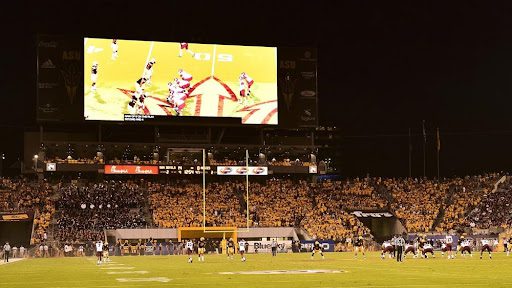
Sustainability looms large not only over Sun Devil Stadium and ASU’s Athletics but over the entire university. In 2021 alone, ASU was ranked #1 in Sierra Magazine’s list of “cool schools” (which is significantly based on the Sustainability Tracking, Assessment & Rating System scores) and 1st in Times Higher Education’s list of U.S. universities regarding their positive global impact. “ASU’s environmental commitment,” states the university’s executive vice president, treasurer, and CFO Morgan R. Olsen, “ensures that Sun Devil community members will enjoy a built environment that is responsive to concerns about energy use, carbon footprint, waste reduction, and other environmental concerns for years to come.”

